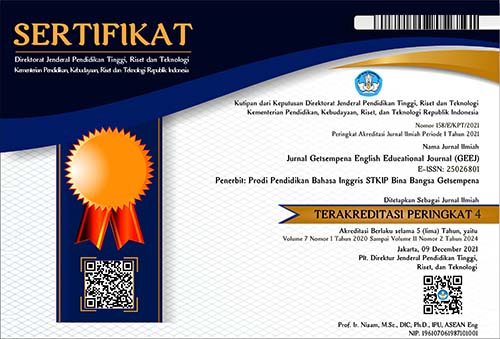COGNITIVE INQUIRY: IS ENGLISH REALLY DIFFICULT FOR SCIENCE STUDENTS?
Abstract
Science students are known miserable in coping very well with language, especially English. This study searched for the truth of this proposition by evaluating the formative test items for senior high-school level used in a science-based school in Aceh, Indonesia. The sources of this study were 150 questions and 35 students’ answers on the pertaining tests for three different grades. The objective of this study was to find out the item facility and distractors’ efficiency of each test item used for science students in their formative test. Methodology deployed was qualitative approach using content analysis in the scope of finding the item facility and distractors’ efficiency for the test items. The result depicted that 84% of the items are in the ‘easy’ index, and 11% in ‘moderate’ index, and 4% ‘difficult’ index. Then, the data show that only 17% of the distractors’ are efficient. The conclusion is that the formative test items are, indeed, easy for science students but with one condition: most of the distractors do not work properly for their cognitive level.
References
Bachman, L. F. 1990. Fundamental Consideration in Language Testing. Oxford: Oxford University Press.
Brown, H. D. (2004). Language assessments: principles and classroom practices. London: Longman.
Deyger, B., & Gorp, K. V. (2015). Determining the scoring validity of a co-constructed CEFR-based rating scale. Language Testing, 32(4), 521-541.
Fulcher, G. & F. Davidson. 2007. Language Testing and Assessment. Boston: Routledge.
Gow, L., Kember, D., & Chow, R. (1999). The effect of English language ability on approaches to learning. Regional English Language Centre Journal, 22 (1), 49-68.
Hadzazy, A. (2011). Life’s extremes: math vs. language. Retrieved on October 21st, 2016 from http: //www.livescience.com/16897
Heaton, J. B. 1989. Writing English Language Tests. NY: Longman.
Hughes, C. (2014). Theory of knowledge aims, objectives, and assessments criteria: an analysis of critical thinking descriptors. Journal of Research in International Education, 13 (1), 30-45.
Kramer, D. B., Lundgren, C., & Mabbot, A. S. (2010). Relating language objectives to Bloom’s taxonomy: how to talk to your mainstream colleagues about language objectives. MinneWITESOL Journal, 27, 43-51.
Mayring, P. (2000). Qualitative content analysis. Forum: Qualitative Social research, 1(2). Art. 20. Retrieved on October 20th, 2016 from http: //nbn.resolving.de/
Patton, M. Q. (2002). Qualitative Evaluation and Research Methods (3rd Ed). London: Sage, Thousand Oaks.
Rimfield, K., Kovas, Y., Dale, P. S., & Plomin, R. (2015). Pleiotropy across academic subjects at the end of compulsory education. Scientific Reports Online, 5(11713). Retrieved on October 21st, 2016 from http: //ww.nature.com/articles/screp11713.
Samad, I A., & Fitriani, S. S. (2016, October 4-6). English proficiency in ASEAN economic community. Paper presented at the 6th Annual International Conference, Syiah Kuala University, Indonesia.
Starfield, S. (1990). Science and language: a new look at some old issues. SAJHE/SATHO, 4(2), 84-89.
Syahputri, V. N. (2016). Enhancing students’ learning motivation by imlementing peer lesson technique in teaching English. In the proceedings of the 2nd International Conference on Multidisciplinary Research, 19-20 October, 2016, pp. 93-100.
Syahputri, V. N., & Ismail, N. M. (2017). English summative test and national curriculum: The compatibility. In the proceedings of the The 6th Aceh Development International Conference, Kuala Lumpur, Malaysia, 15-16 March, 2017, pp. 100-1108.

























